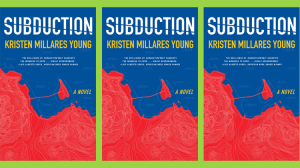 Sour Heart by Jenny Zhang / Lenny (Random House) / 320 pages / 0399589386 / August 1, 2017
Sour Heart by Jenny Zhang / Lenny (Random House) / 320 pages / 0399589386 / August 1, 2017
In “My Days and Nights of Terror,” Mande, a Chinese immigrant, is made fun of by Korean classmates for her accent. The self-hatred is both ironic and hypocritical, evident in Mande’s fellow immigrants and herself. “No one had it in them to have a heart for anyone, not even themselves, or at least, not the selves they once were that other people still had to be.” Yet, it’s this “heart” that Jenny Zhang strives to have and understand in her debut short story collection, Sour Heart.
Zhang explores the bittersweet immigrant experience through the eyes of six different Chinese-American girls, who all know of each other within the tight-knit Chinese community and whose lives are interconnected through their parents’ decision to come to America. After the Chinese Exclusion Act of 1882 was repealed in 1943, it wasn’t until the Immigration and Nationality Act of 1965 that finally eliminated racial and nationality-based discrimination in immigration quotas. This resulted in a wave of Chinese immigration to America in the late 1970s, opening the door for a multitude of other Asians to follow, including my own parents from Korea in the 1980s. Although I am a Korean-American male, I myself felt rooted in each of the seven stories because of my own parents’ decision.
Many of the stories dealt with sexuality from a Chinese girl’s perspective, but rather than alienating, I found the situations liberating. Asian women have typically been exoticized and objectified, so it was refreshing to hear an Asian-American voice own sexuality in an honest way as part of one’s individual identity. Rather than a bystander, I felt like a participant in the stories, and this experience was only deepened by the first person narrative, which bordered on autobiography whenever Zhang went into the contextual details of her characters’ lives. It began to take a collective toll as I wondered which pieces were factual or embellishment, but soon realized that Zhang’s voice rang true because of, not despite, its familiarity.
This was evident from the first story where Zhang describes the plight of immigrant children. In “We Love You Crispina,” Christina cannot imagine progress beyond that of her own parents, although that is the dream and expectation of many Asian immigrant families:
…I would answer them in English, which I also wasn’t so good at, but it was understood that while I could still improve in either language, my parents could not, they were on a road to nowhere, the wall was right up against them, so it was up to me to get really good, it was up to me to shine and that scared me because I wanted to stay behind with them, I didn’t want to go any further than they could go.
For Christina, the tension also lies between constantly moving from one poverty-stricken neighborhood to another, sometimes sharing one room with multiple families. The only comfort she has is being between her parents, knowing she couldn’t be a person without them. Zhang struggles with the inevitability of growing up and growing apart from the immigrant parents who unconditionally love their children. When the children fulfill their parents’ wishes to progress beyond them and inevitably leave them behind socially and culturally, what identity is there to cling to?
In “The Empty the Empty the Empty,” Lucy, a girl unprepared for puberty and the shedding of her old self it requires, realizes the only thing that separates herself and Frangie, a lonely girl Lucy’s mother forces her to befriend, is her own family:
I wondered what it would be like if my mother had died like Frangie’s, if my father was as unfit as Frangie’s father was, and if Eddie moved out to live with his girlfriend. Where would I go after school? Who would take care of me? I felt a deep disappointment in myself that when I looked at Frangie on my bed, I could only picture myself.
For Zhang, the family doesn’t just provide an identity, but provides a protective barrier from one’s self, from all the bad choices that one could make if it weren’t for the family. Whether this acts as a life-saving airbag or as excessive bubblewrap is hard to distinguish because the girls cannot put it to the test.
Zhang further explores the fear of trying to find an identity apart from family in “Our Mothers Before Them” (an intergenerational back and forth about the stability a girl’s uncle brings her fragile mother) and “The Evolution of My Brother” (a story of a brother’s dependence on his sister too overbearing to be desirable until she sees he doesn’t need her anymore). In the latter, Jenny, a girl who only wants to be away from her family, realizes that to be freed from family meant you were freed from your very self. “…the days of resenting my parents for loving me too much and my brother for needing me too intensely have been replaced with the days of feeling bewildered by the prospect of finding some other identity besides ‘daughter’ or ‘sister.’” There seems to be no other identity outside of the one provided for by family because, for better or worse, the girls in these stories aren’t allowed to have one.
But Zhang doesn’t resent this when she takes an oblique jab at the kind of family Jenny wished she came from:
I envied white girls whose relationships with their parents were so abysmal that they could never disappoint them. I wanted white parents who didn’t care where I went or what I did, parents who encourage to leave home instead of guilting me into staying their kid forever.
Zhang’s characters seem to be thankful for the kind of family they came from, at least in hindsight, but this gratitude doesn’t extend beyond the parents.
In “Why Were They Throwing Bricks?” Stacey is appalled at her grandmother’s shameless need for her and her brother’s undivided devotion. This further elaborates the cost of immigrant parents who have left behind their own parents to give their children a better opportunity despite the cultural and familial rift. The children are not only unable to fully understand their parents, they are unable to understand their grandparents or their motherland. Christina, all grown up in “You Fell into the River and I Saved You!” falls into confusion and loneliness as she mentally recalls a million interactions and questions with relatives before a family reunion.
She’s lost in the midst of family members she only knows through sporadic interactions from trips to China. Then she remembers her parents, “…and though I knew it wouldn’t last forever, I stayed between them until I remembered who I was again and no longer felt lonely.” In Sour Heart, the presence of immigrant parents in their children’s lives is the only constant in a life stuck between countries. It is this immigrant self in each of my parents that I find myself clutching to, even as a born citizen. I feel the same tension that Zhang exhibits in her stories, woven through a myriad of details both foreign and familiar in the Asian-American experience. The tension is palpable as I see my parents grow older with nothing to show for their sacrifices, but me and my sister. As the children of immigrants grow up, Zhang’s “heart” understands that the immigrant “selves” that the children once were, their parents will still have to be. Zhang reminds us that all we have to show for our parents’ experiences are our fading dreams of being just like them.




Leave a Reply